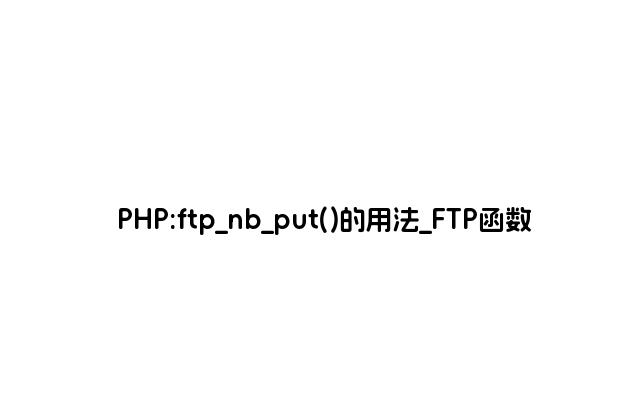
(PHP 4, PHP 5)
sprintf — Return a formatted string
说明
string sprintf ( string$format
[, mixed $args
[, mixed $...
]] )
Returns a string produced according to the formatting string
format.
参数
format
The format string is composed of zero or more directives: ordinary characters (excluding %) that are copied directly to the result, and conversion specifications, each of which results in fetching its own parameter. This applies to both sprintf() and printf().
Each conversion specification consists of a percent sign (%), followed by one or more of these elements, in order: An optional sign specifier that forces a sign (- or +) to be used on a number. By default, only the - sign is used on a number if it's negative. This specifier forces positive numbers to have the + sign attached as well, and was added in PHP 4.3.0. An optional padding specifier that says what character will be used for padding the results to the right string size. This may be a space character or a 0 (zero character). The default is to pad with spaces. An alternate padding character can be specified by prefixing it with a single quote ('). See the examples below. An optional alignment specifier that says if the result should be left-justified or right-justified. The default is right-justified; a - character here will make it left-justified. An optional number, a width specifier that says how many characters (minimum) this conversion should result in. An optional precision specifier in the form of a period (`.') followed by an optional decimal digit string that says how many decimal digits should be displayed for floating-point numbers. When using this specifier on a string, it acts as a cutoff point, setting a maximum character limit to the string.
A type specifier that says what type the argument data should be treated as. Possible types: % - a literal percent character. No argument is required. b - the argument is treated as an integer, and presented as a binary number. c - the argument is treated as an integer, and presented as the character with that ASCII value. d - the argument is treated as an integer, and presented as a (signed) decimal number. e - the argument is treated as scientific notation (e.g. 1.2e+2). The precision specifier stands for the number of digits after the decimal point since PHP 5.2.1. In earlier versions, it was taken as number of significant digits (one less). E - like %e but uses uppercase letter (e.g. 1.2E+2). f - the argument is treated as a float, and presented as a floating-point number (locale aware). F - the argument is treated as a float, and presented as a floating-point number (non-locale aware). Available since PHP 4.3.10 and PHP 5.0.3. g - shorter of %e and %f. G - shorter of %E and %f. o - the argument is treated as an integer, and presented as an octal number. s - the argument is treated as and presented as a string. u - the argument is treated as an integer, and presented as an unsigned decimal number. x - the argument is treated as an integer and presented as a hexadecimal number (with lowercase letters). X - the argument is treated as an integer and presented as a hexadecimal number (with uppercase letters).
Variables will be co-erced to a suitable type for the specifier: Type Handling Type Specifiers string s integer d, u, c, o, x, X, b double g, G, e, E, f, F
WarningAttempting to use a combination of the string and width specifiers with character sets that require more than one byte per character may result in unexpected results
The format string supports argument numbering/swapping. Here is an example:
Example #1 Argument swapping
<?phpThis will output "There are 5 monkeys in the tree". But imagine we are creating a format string in a separate file, commonly because we would like to internationalize it and we rewrite it as:
$num = 5;
$location = 'tree';
$format = 'There are %d monkeys in the %s';
echo sprintf($format, $num, $location);
?>
Example #2 Argument swapping
<?phpWe now have a problem. The order of the placeholders in the format string does not match the order of the arguments in the code. We would like to leave the code as is and simply indicate in the format string which arguments the placeholders refer to. We would write the format string like this instead:
$format = 'The %s contains %d monkeys';
echo sprintf($format, $num, $location);
?>
Example #3 Argument swapping
<?phpAn added benefit here is that you can repeat the placeholders without adding more arguments in the code. For example:
$format = 'The %2$s contains %1$d monkeys';
echo sprintf($format, $num, $location);
?>
Example #4 Argument swapping
<?phpWhen using argument swapping, the n$ position specifier must come immediately after the percent sign (%), before any other specifiers, as shown in the example below.
$format = 'The %2$s contains %1$d monkeys.
That's a nice %2$s full of %1$d monkeys.';
echo sprintf($format, $num, $location);
?>
Example #5 Position specifier with other specifiers
<?php
$format = 'The %2$s contains %1$04d monkeys';
echo sprintf($format, $num, $location);
?>
以上例程会输出:
The tree contains 0005 monkeys
Note:
Attempting to use a position specifier greater than
PHP_INT_MAX will result in
sprintf() generating warnings.
The c type specifier ignores padding and width
args
...
返回值
Returns a string produced according to the formatting string
format.
范例
Example #6 printf(): various examples
<?php
$n = 43951789;
$u = -43951789;
$c = 65; // ASCII 65 is 'A'
// notice the double %%, this prints a literal '%' character
printf("%%b = '%b'n", $n); // binary representation
printf("%%c = '%c'n", $c); // print the ascii character, same as chr() function
printf("%%d = '%d'n", $n); // standard integer representation
printf("%%e = '%e'n", $n); // scientific notation
printf("%%u = '%u'n", $n); // unsigned integer representation of a positive integer
printf("%%u = '%u'n", $u); // unsigned integer representation of a negative integer
printf("%%f = '%f'n", $n); // floating point representation
printf("%%o = '%o'n", $n); // octal representation
printf("%%s = '%s'n", $n); // string representation
printf("%%x = '%x'n", $n); // hexadecimal representation (lower-case)
printf("%%X = '%X'n", $n); // hexadecimal representation (upper-case)
printf("%%+d = '%+d'n", $n); // sign specifier on a positive integer
printf("%%+d = '%+d'n", $u); // sign specifier on a negative integer
?>
以上例程会输出:
%b = '10100111101010011010101101' %c = 'A' %d = '43951789' %e = '4.39518e+7' %u = '43951789' %u = '4251015507' %f = '43951789.000000' %o = '247523255' %s = '43951789' %x = '29ea6ad' %X = '29EA6AD' %+d = '+43951789' %+d = '-43951789'
Example #7 printf(): string specifiers
<?php
$s = 'monkey';
$t = 'many monkeys';
printf("[%s]n", $s); // standard string output
printf("[%10s]n", $s); // right-justification with spaces
printf("[%-10s]n", $s); // left-justification with spaces
printf("[%010s]n", $s); // zero-padding works on strings too
printf("[%'#10s]n", $s); // use the custom padding character '#'
printf("[%10.10s]n", $t); // left-justification but with a cutoff of 10 characters
?>
以上例程会输出:
[monkey] [ monkey] [monkey ] [0000monkey] [####monkey] [many monke]
Example #8 sprintf(): zero-padded integers
<?php
$isodate = sprintf("%04d-%02d-%02d", $year, $month, $day);
?>
Example #9 sprintf(): formatting currency
<?php
$money1 = 68.75;
$money2 = 54.35;
$money = $money1 + $money2;
// echo $money will output "123.1";
$formatted = sprintf("%01.2f", $money);
// echo $formatted will output "123.10"
?>
Example #10 sprintf(): scientific notation
<?php
$number = 362525200;
echo sprintf("%.3e", $number); // outputs 3.625e+8
?>
参见
printf() - 输出格式化字符串 sscanf() - 根据指定格式解析输入的字符 fscanf() - 从文件中格式化输入 vsprintf() - 返回格式化字符串 number_format() - 以千位分隔符方式格式化一个数字






